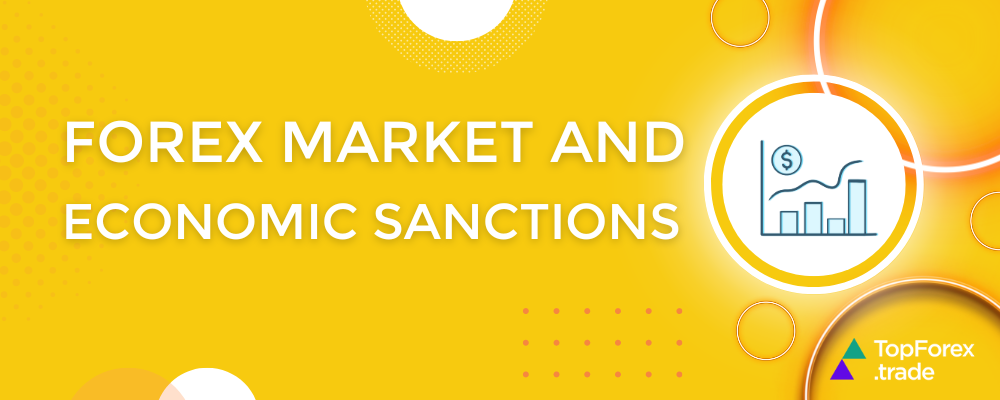Economic sanctions: implications for Forex traders

Economic sanctions are more than just political statements—they’re powerful tools that can shake up global markets. For Forex traders, these sanctions can add a new level of complexity and risk to their strategies. When countries impose trade restrictions or financial penalties, the effects can ripple through the currency markets, leading to increased volatility and unpredictable shifts in exchange rates. In this article, we’ll explore how economic sanctions impact Forex trading, from affecting currency values to altering market dynamics.
Economic sanctions and FX trading

Economic sanctions have far-reaching effects across multiple financial markets, influencing Forex, stocks, commodities, and cryptocurrencies. Understanding these impacts can help traders devise strategies to navigate these turbulent waters effectively. Here’s a detailed look at how sanctions affect each market and strategy, complete with real-world examples to illustrate each approach.
Sanctions and impact on currency values
Sanctions can cause dramatic fluctuations in the affected country’s currency. For example, sanctions often lead to a drop in the currency’s value due to decreased economic activity and investor confidence. Conversely, currencies of sanction-imposing countries may appreciate if they are seen as more stable.
Example: When the U.S. imposed sanctions on Russia in 2014, the Russian ruble fell sharply against the USD. Forex traders who anticipated this could have shorted the ruble against the dollar, capitalizing on the ruble’s decline.
Sanctions and stock market
Sanctions can disrupt stock markets by affecting companies that rely on international trade or have significant operations in sanctioned countries. This can lead to declines in stock prices and reduced market capitalizations. Conversely, companies in sanction-imposing countries might benefit from altered trade dynamics.
Example: After the U.S. imposed sanctions on Iran, companies like Boeing and General Electric, which had significant business interests in the region, saw their stock prices fall. Conversely, defense and energy companies in non-sanctioned countries could benefit from increased demand or reduced competition, providing trading opportunities.
Sanctions and commodity market
Sanctions can affect commodity markets by disrupting supply chains and trade flows. Sanctions on key commodity producers can lead to price increases due to supply shortages.
Example: Sanctions on Venezuela’s oil industry led to a significant reduction in global oil supply, causing oil prices to spike. Traders who anticipated this disruption could have bought oil futures or invested in energy sector ETFs to profit from rising oil prices.
Sanctions and equities and other financial instruments market
Economic sanctions can influence equities and other financial instruments by shifting investor sentiment and altering market dynamics. Companies with exposure to sanctioned countries might see their stock prices affected, while those in unaffected regions might benefit.
Example: Sanctions targeting Turkey due to its geopolitical actions led to declines in Turkish stocks. Traders could have shorted Turkish equities or invested in stable multinational corporations to hedge against Turkish market volatility.
Sanctions and Crypto market
Sanctions can impact cryptocurrencies in various ways. While cryptocurrencies might offer an alternative financial system in sanctioned environments, increased regulatory scrutiny can lead to market volatility.
Example: During heightened sanctions on Russia, there was a surge in demand for cryptocurrencies as individuals sought to bypass traditional financial systems. Traders could have invested in cryptocurrencies like Bitcoin or Ethereum to benefit from increased demand. However, they should also be cautious of potential regulatory crackdowns, which can lead to increased volatility.
Strategies for FX traders to benefit from sanctions

- Cross-market analysis:
When sanctions are imposed on a major oil-producing country, such as Iran, traders should not only monitor oil prices but also assess how oil-exporting countries’ currencies might be impacted. If oil prices rise, currencies of oil-exporting nations like Canada or Norway might appreciate. Traders could use this insight to trade currency pairs such as USD/CAD or USD/NOK.
- Diversify investments:
If sanctions are expected to disrupt global trade, traders could diversify by investing in commodities, equities, and currencies from non-sanctioned countries. For instance, investing in U.S. technology stocks while shorting stocks from a sanctioned country could balance the risk.
- Monitor market sentiment:
Following the announcement of sanctions on a major economy, monitoring market sentiment and reactions can provide trading signals. If the market overreacts, leading to excessive volatility in a stock or currency, traders might find short-term trading opportunities.
- Trade volatility:
Sanctions often lead to increased volatility in affected markets. Traders could use options strategies to benefit from these price swings. For instance, buying call options on oil futures during a supply disruption could provide leveraged gains if oil prices rise.
- Hedging strategies:
To hedge against potential adverse effects from sanctions, traders could use futures contracts to lock in prices for commodities or options to protect against currency fluctuations. For instance, if expecting a decline in a currency due to sanctions, traders might buy put options on that currency pair.
- Stay informed:
Regularly monitoring news related to sanctions and geopolitical developments allows traders to anticipate market reactions. For instance, if news suggests imminent sanctions on a specific sector, traders can preemptively adjust their positions in related stocks or commodities.
By understanding how economic sanctions affect various markets and employing these strategies, traders can better navigate the complexities of global finance, turning potential disruptions into profitable opportunities.
Top Forex brokers to trade during economic sanctions
Trading Forex during periods of economic sanctions requires choosing a reliable and adaptable broker. The right broker can provide the necessary tools, resources, and support to navigate the increased volatility and uncertainty that sanctions bring to the market. This list highlights the Top Forex brokers that excel in offering robust trading platforms, comprehensive market analysis, competitive spreads, and strong regulatory oversight. These brokers are equipped to help traders capitalize on market movements, manage risks effectively, and maintain confidence in their trading strategies even in the face of geopolitical disruptions.
XTB FX trading
XTB stands out as a premier choice for Forex and CFD trading, showcasing a robust global presence in over 190 countries. Renowned for its dedication to financial security and transparency, XTB operates under the regulation of esteemed authorities such as the FCA, CySEC, and KNF.
Offering over 1,500 CFDs in forex pairs, indices, commodities, shares, and cryptocurrencies, XTB presents a wealth of trading opportunities. Traders benefit from user-friendly platforms like xStation and MetaTrader 4, which are equipped with advanced tools to facilitate informed decision-making.
Catering to diverse trading styles, XTB provides various account types, including Standard and swap-free options, each with customized fees and benefits. The broker also delivers a comprehensive suite of research and analysis resources, such as daily market insights, economic calendars, and webinars, ensuring traders are well-informed of market trends and major events.
Exness FX trading
Exness is a well-regarded Forex broker, offering a broad spectrum of trading options, including currency pairs, commodities, indices, and cryptocurrencies.
Committed to regulatory compliance, Exness operates under the supervision of esteemed authorities like the FCA in the UK and CySEC in Cyprus, ensuring a secure trading environment.
The broker provides competitive spreads that vary by account type, featuring both Standard and Professional accounts with distinct benefits and conditions.
Customer support is accessible through email, live chat, and phone, ensuring traders have the assistance they need. Exness offers popular trading platforms such as MetaTrader 4 (MT4) and MetaTrader 5 (MT5), known for their user-friendly design and advanced charting tools, delivering a seamless trading experience.
Plus500 FX and CFDs trading
Plus500 is a renowned online trading platform that offers Contract for Difference (CFD) trading across various Asian countries. CFDs enable traders to speculate on the price movements of underlying financial instruments without owning the actual assets.
In Asia, Plus500 has gained popularity due to its user-friendly platform, wide range of tradable instruments, and strong regulatory compliance. The platform provides access to a broad selection of CFDs, including stocks, indices, commodities, cryptocurrencies, and Forex pairs. This diversity allows traders to build diversified portfolios and explore different markets according to their strategies and preferences.
A significant advantage of trading with Plus500 in Asia is its ease of use. The platform features a simple and intuitive interface, making it accessible to both beginner and experienced traders. Plus500 also offers a demo account option, allowing users to practice their trading strategies without risking real money.
Regulatory compliance is a cornerstone of Plus500’s reputation. The platform operates under the regulations of respected financial authorities in various Asian countries, ensuring a secure and transparent trading environment. This regulatory oversight instills confidence and peace of mind in traders.
Additionally, Plus500 offers competitive spreads and leverage, enabling traders to maximize potential profits. While leverage allows control of larger positions with a smaller initial investment, traders must exercise caution and understand the associated risks.
Plus500 provides multilingual customer support, catering to the needs of its Asian clientele by offering assistance in local languages. The platform also supports various deposit and withdrawal options to accommodate its diverse user base.
82% of retail investor accounts lose money when trading CFDs with this provider. You should consider whether you can afford to take the high risk of losing your money.
HF Markets FX trading
HF Markets is a premier choice for traders seeking a wide range of asset trading options. Offering access to over 1,200 financial instruments, including currency pairs, energies, indices, commodities, ETFs, stocks, and bonds, HF Markets meets diverse trading needs.
The broker supports several trading platforms, including MT4 and MT5, which are accessible on desktop, web, and mobile devices. Their trading app enhances convenience, while a VPS service boosts performance for traders.
HF Markets provides various account types, such as Premium, Pro, Zero, and Cent, each with distinct minimum deposits, leverage, and spreads. Beginners can utilize a demo account to practice strategies and explore different instruments before investing real funds.
BlackBull FX trading
BlackBull Markets is a trusted and secure online Forex broker, offering a comprehensive range of trading instruments such as commodities, currency pairs, stocks, futures, indices, and cryptocurrencies. This diverse selection provides traders with extensive market access.
Under Seychelles regulation, BlackBull ensures a safe trading environment for its users. The broker offers several account types, including standard, prime, institutional, and Islamic (no swap) accounts, along with a demo account for risk-free practice.
The broker distinguishes itself with flexible trading platforms, including MT4, MT5, cTrader, Web Trader, and TradingView. Additionally, BlackBull provides specialized platforms like BlackBull CopyTrader and BlackBull Shares, and offers mobile and tablet apps for convenient access.
Committed to trader education, BlackBull features an educational hub, webinars, and tutorials designed to equip traders with the necessary knowledge and skills.
Related articles:
Economic sanctions and Forex market - FAQ